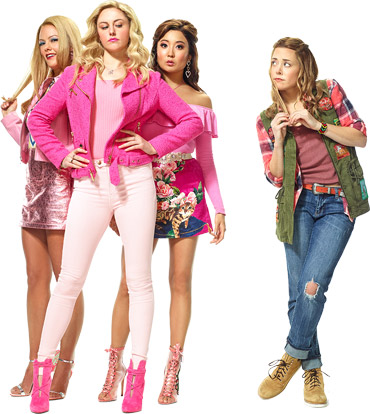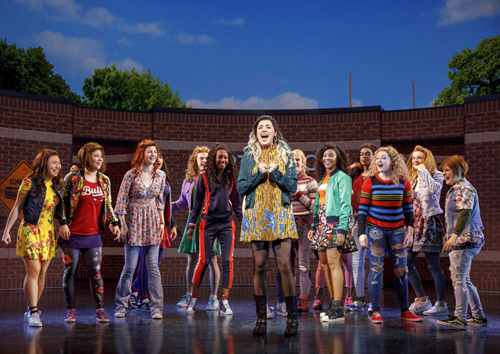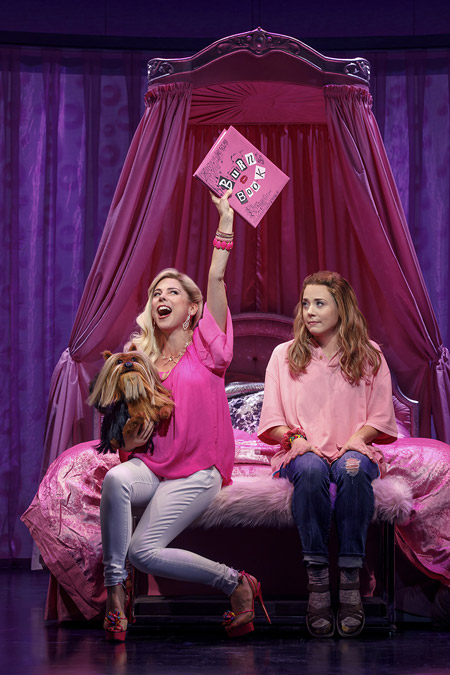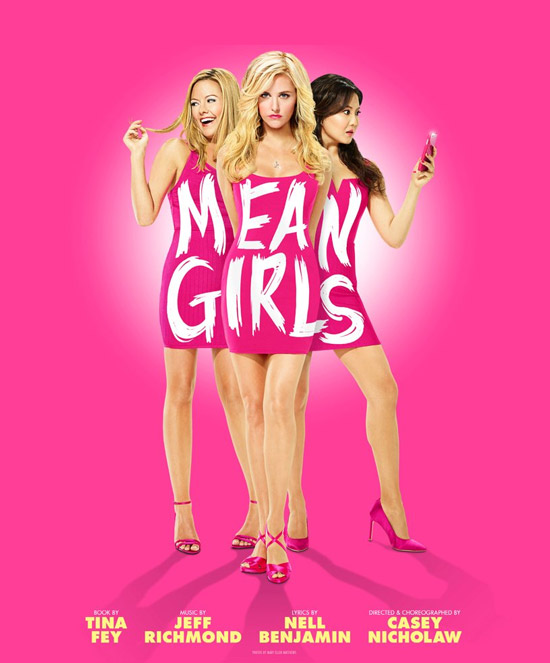ARTS & ENTERTAINMENT - August, 2018
Mean Girls
Tina Fey’s stage production Mean Girls
WRITERS: Anna Silverman, Samantha Michaels, Jacqui Martin, Lauren Mckechnie, Claire Mckechnie
REPORTERS: Kyle Austin, Lily Baldwin, C.C. Clark, Kylar Flynn, Brandon Lopez, Simone Harper, Angie Gonzalez, Sabine Lloyd, Jacqui Martin, Lauren McKechnie, Claire McKechnie, Samantha Michaels, Josh Santos, Anna Silverman, Campbell Slavin and Lilli Wanninger (FROM: Community School, Drew, Redwood High, Marin Academy, San Rafael High, St. Ignatius Preparatory, Tamalpais High and University High Schools)
The Plastics is that high school clique everyone hates—and wants to be a part of. Regina George, The Plastics’ flaw-free ringleader, expresses her true self with a slogan emblazoned across the tee shirt she wears like a second skin: “A little bit dramatic.” In Mean Girls, book writer Tina Fey delves into the seemingly marvelous life of the infamous Regina and her posse, making packed audiences at the August Wilson Theatre laugh and cheer—even if Regina’s “marvelous life” comes down to a whole lotta pink, a whole lotta makeup, a whole lotta plastic and a whole lotta drama.
Mean Girls is a screen-to-stage Broadway production based on the 2004 movie written by Fey (from Rosalind Wiseman’s book) and directed by Mark Waters. The movie was such a hit, the pressure was on for the stage version to be at least as jaw-droppingly awesome. For those lucky enough to score tickets to this smash hit (12 Tony nominations!), the build-up is over the top: the huge star-studded marquee; the Plastics-pink doors leading into the theater; the tattered juicy-gossip pages of the Burn Book forming the stage’s backdrop. But as we found our seats and the lights dimmed and the overture began, we were skeptical about how well Fey could weave songs and choreography into the Mean Girls movie we know and love. Spoiler alert: They pulled it off—and with style.
The songs (written by Tina’s husband, composer Jeff Richmond, lyricist Nell Benjamin and director/choreographer Casey Nicholaw) actually guided us into a deeper understanding of each character and their unique storylines.
The musical emulates the movie in many ways, focusing on Cady Heron, a unique girl who enters a Chicago high school after living in Africa all her life. Exposed for the first time to the trials and tribulations of an American teenager, she struggles to fit in. She’s invited into the popular yet fearsome “Plastics” clique, where she embraces a morality similar to the lions’ of the African savannah: ferocity and the cutthroat competition true popularity demands. That is, until The Plastics’ alpha dog Regina George brings together every girl in the school in an act of jealousy-fueled hatred. The musical is hilarious but also offers great insight into the problems and pressures of teenagehood. Its message: Be yourself.
Mean Girls’ outstanding attributes are its music and dancing, its humor and its positive message. The show is a roller coaster of emotions: lots of ups and downs, but no matter how emotional it gets, there’s always a good laugh right around the corner. There are several characters you can count on to make you laugh, but the one who really stands out is Karen Smith, played by Kate Rockwell. With her “shiny hair,” perfect teeth and impeccable spelling, she’s definitely a standout. (One of her singing lines is, “This is modern feminism talking. I expect to run the world in shoes I cannot walk in.”) The clever and cunning script is of course by Fey, the comedian, actress and Saturday Night Live/30 Rock icon; every line, scene and act is a brilliantly written jewel.
 As if watching Mean Girls from (nearly) front-row seats wasn’t enough, we also had the amazing experience of interviewing four of the show’s stars: Kyle Selig (who plays Aaron Samuels), Taylor Louderman (Regina George), Kerry Butler (Ms. George and Ms. Norbury) and Devon Hadsell (Gretchen Weiners).
As if watching Mean Girls from (nearly) front-row seats wasn’t enough, we also had the amazing experience of interviewing four of the show’s stars: Kyle Selig (who plays Aaron Samuels), Taylor Louderman (Regina George), Kerry Butler (Ms. George and Ms. Norbury) and Devon Hadsell (Gretchen Weiners).
After just a few questions we realized that each member of the cast has learned something different from being part of Mean Girls. Selig, who portrays Cady’s crush Aaron Samuels, explained that the show has taught him a sense of community and humility. “You might get success, but then what’s the point? You’re alone. I think it’s important to find a group of people who love to do what you do and stick close to them. Finding that community challenges yourself and it challenges them and you will make cool stuff together.”
 Louderman, who plays Regina George, said that she had to be kinder to herself to “snap into” her totally confident onstage persona. “After working with the show and my character for awhile, I didn’t know I could feel as secure in my own skin as I do. Outside of the show I try to be really silly…I think it’s who I am. But the show has forced me to be nicer, not take myself too seriously, and be kinder to myself. If I mess up, it’s okay. Everybody’s just trying to do the best they can do.”
Louderman, who plays Regina George, said that she had to be kinder to herself to “snap into” her totally confident onstage persona. “After working with the show and my character for awhile, I didn’t know I could feel as secure in my own skin as I do. Outside of the show I try to be really silly…I think it’s who I am. But the show has forced me to be nicer, not take myself too seriously, and be kinder to myself. If I mess up, it’s okay. Everybody’s just trying to do the best they can do.”
Although it seems like actors in a big-ticket Broadway show deliver a perfect and seamless performance every time, they’re only human. And in a dramatic, eccentric and lively musical like this one, the actors have to work extra hard to combat stage fright and avoid mess-ups. We asked Kerry Butler if she ever gets nervous in front of hundreds of people.
“I don’t usually get nervous after I’ve had a long rehearsal process. I’ll get nervous into the run after I’ve been doing it a year or so, then all of the sudden I’ll start forgetting my lines because something will distract me. It’s all in your mind. Then all you have to do is take a breath, don’t think about it, open your mouth, and the words will come out if you take your mind out of it.”
Every cast member of Mean Girls has a different way of getting into character. It’s fairly easy for Selig because “I’m playing an extension of myself. I’m playing a version of myself who’s interested in sports, which is not really true of myself generally, somebody who’s concerned with being nice, who’s concerned with treating people well, and that’s sort of what Aaron leads with. As far as warming up goes, it’s not necessarily about putting on a character; it’s sort of remembering who I am.”
It’s much harder for Louderman because she doesn’t relate to scary Regina George as much as Kyle relates to sweet Aaron Samuels. “I play a character who’s very confident all the time. I don’t feel that way myself and so I’ve had to create an inner monologue—to be good to myself, eat better and go to the gym to help me feel like this character so I can snap into it. But if I’m nervous as I come out on that stage, I just literally tell myself, ‘You’re awesome. You’ve got this.’ And it works. It hasn’t always, but I think everybody’s different. You develop what works for you.”
Forging your own path means encountering obstacles, and obstacles aren’t something the Mean Girls cast shied away from on their path to success. “There are way more actors than jobs, so you have to stand out,” said Louderman. “You’ve got to work harder than everyone else. But if you know what you can bring to the table that’s different than everybody, you’re going to have a better chance.” Hadsell agreed, saying one of the most important things in life is “really getting to know yourself and who you are as a person.”
There are way more actors than jobs, so you have to stand out... work harder than everyone else. But if you know what you can bring to the table that’s different than everybody, you’re going to have a better chance.
Although each actor took a different route to Broadway, they agreed on one thing: you have to be persistent. “You have something special that you’re going to bring but they might be looking for a completely different body type, whatever…don’t take it personally,” Butler said. “Your goal going into the audition is just to do your best. I say ‘I get what I get, I don’t get upset.’ I just get the part that’s meant for me. So I usually don’t get upset when I don’t get [the part]. You get rejected every day…people who can take rejection are the ones who can make it.”
Louderman agreed. “You get told no a lot, so you have to be persistent. And I think one of the biggest things is getting to know yourself and know what you can bring to the table and understand the big picture. You’re just trying to tell a story. To be a great actor/actress you have to love it and can’t be in it for the money and the fame. If we do it for the fame, then we’re miserable. It’s not worth it.”
Devon Hadsell, a member of the Ensemble, grew up in the Bay Area and attended Marin Dance Theatre. She told us, “I lived in Napa since I was five. There wasn’t a lot of opportunity in Napa for theater so my mom would drive me an hour to San Francisco for acting and 45 minutes to San Rafael for ballet and for dance.”
The importance of overcoming rejection and setbacks isn’t, of course, limited to the theater. Those who succeed in life are the ones who persist. However, success is oftentimes subjective. The concept of popularity and success is tested at the beginning of Mean Girls, as every high school student is forced to fit a stereotype. But over time Cady Heron breaks the mold she was forced into by creating her own role for herself. She shows us that a girl can win a Mathletes competition and be a prom queen at the same time.
The show pulls audiences into the lives of both mean girls and the high school outcasts who are trying to make their way through their teenage years as they realize that the color shirt you wear on Wednesday isn’t the only thing that matters, that what really matters is being yourself and being kind to others. Actors realize that they’re not always going to be onstage, that they’ll have a life outside the theater and that it’s important to not be distracted by celebrity.
To be a great actor/actress you have to love it and can’t be in it for the money and the fame. If we do it for the fame, then we’re miserable. It’s not worth it.
“It’s about really getting to know yourself and who you are as a person,” Hadsell, who plays Gretchen Weiners, said. “Sometimes it’s so hard in this business because of all the attention you get, and it’s so easy to feed off that and feel like you always need it. But in those moments of silence when you don’t have that, do you like who you are? Are you kind? Are you a good person? And I think that’s so important too to hold onto in this crazy world that we have here.”
After the show, we agreed that the high expectations the movie had set for us were exceeded by the musical version. In the end, “all the mean” in Mean Girls was washed away when the characters realized that they were special in their own way.
Hadsell called Mean Girls’ positive message a special one. “It tells you to be yourself. At the end of the show, we are [all] stars. Every individual on that stage, everybody’s so different, and I think that’s kind of the message.” Selig adds, “The idea is that calling somebody ugly won’t make you look better looking. Calling someone dumb won’t make you any smarter. That’s the idea—focus on yourself and stay in your lane and the world will be better.”
With music, dancing and humor on an emotional roller coaster, Tina Fey’s stage production succeeds—in style





